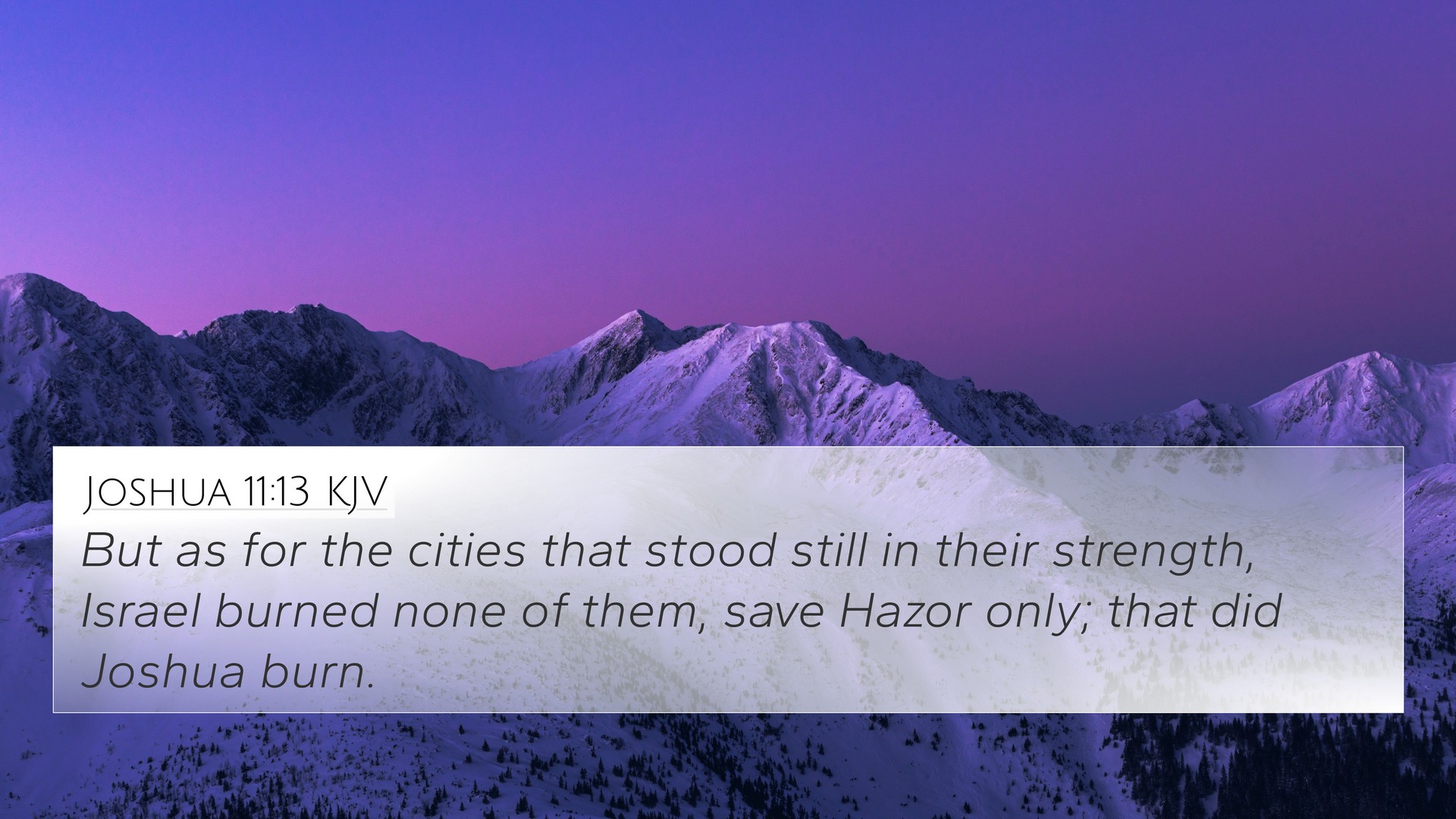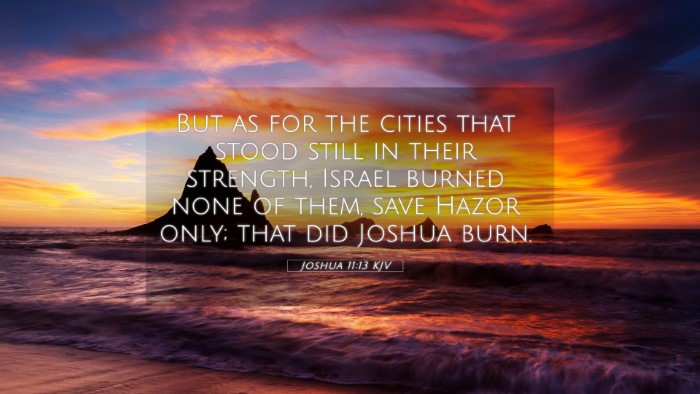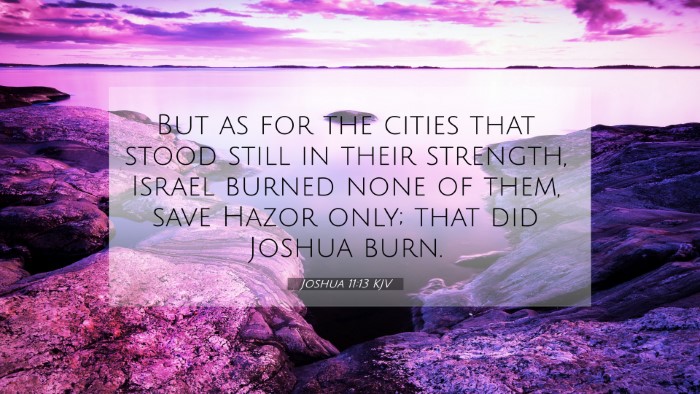Old Testament
Genesis Exodus Leviticus Numbers Deuteronomy Joshua Judges Ruth 1 Samuel 2 Samuel 1 Kings 2 Kings 1 Chronicles 2 Chronicles Ezra Nehemiah Esther Job Psalms Proverbs Ecclesiastes Song of Solomon Isaiah Jeremiah Lamentations Ezekiel Daniel Hosea Joel Amos Obadiah Jonah Micah Nahum Habakkuk Zephaniah Haggai Zechariah MalachiJoshua 11:13 Similar Verses
Joshua 11:13 Cross References
But as for the cities that stood still in their strength, Israel burned none of them, save Hazor only; that did Joshua burn.
Uncover the Rich Themes and Topics of This Bible Verse
Listed below are the Bible themes associated with Joshua 11:13. We invite you to explore each theme to gain deeper insights into the Scriptures.
Joshua 11:13 Cross Reference Verses
This section features a detailed cross-reference designed to enrich your understanding of the Scriptures. Below, you will find carefully selected verses that echo the themes and teachings related to Joshua 11:13 KJV. Click on any image to explore detailed analyses of related Bible verses and uncover deeper theological insights.

Jeremiah 30:18 (KJV) »
Thus saith the LORD; Behold, I will bring again the captivity of Jacob's tents, and have mercy on his dwellingplaces; and the city shall be builded upon her own heap, and the palace shall remain after the manner thereof.
Joshua 11:13 Verse Analysis and Similar Verses
Understanding Joshua 11:13
Joshua 11:13 reads: "But as for the cities that stood still in their strength, Israel burned none of them, save Hazor only; that did Joshua burn." This verse holds significant meaning regarding God's commands, the fulfillment of Israel's mission, and the nature of divine judgment through warfare.
Exegesis and Interpretation
This passage stands amidst the narrative of Israel's conquest of the Promised Land, specifically detailing how Joshua led the Israelite armies against several kings in the north. The act of burning Hazor, the chief city among the Canaanites, underscores a message of total victory and the utter desolation of Israel’s enemies.
Thematic Explorations
Several key themes emerge from this verse:
- Judgment and Obedience: The destruction of Hazor serves as a divine judgment against the idolatrous practices of its inhabitants, showcasing God's command for complete destruction of evil.
- God’s Sovereignty: The fact that the cities which were strong remained intact implies the selective nature of God’s will in granting victory to His people.
- Purpose of Warfare: The battle narratives are not mere accounts of historical events but serve a theological purpose, highlighting the necessity of obedience to God's commands in spiritual warfare.
Commentary Insights
Here’s a summarized perspective from notable public domain commentaries:
- Matthew Henry: Henry emphasizes that Joshua’s actions were directed by God’s command and reflect the seriousness with which Israel must consider the conquest of the land. The sparing of certain cities indicates God’s specific intentions regarding the inhabitants.
- Albert Barnes: Barnes notes that the burnt cities symbolize the total defeat of the Canaanite opposition. He highlights the importance of understanding this event in light of God's promise to Israel regarding the land.
- Adam Clarke: Clarke offers a deeper look at the symbolism behind the cities left standing, asserting they represent the challenges that remain for Israel. He finds significance in the reliance on God’s guidance in military endeavors.
Bible Verse Cross-References
This verse can be enriched through various cross-references that highlight related themes and narratives throughout the Scriptures:
- Deuteronomy 7:2: Commands regarding the destruction of Canaanite nations.
- 1 Kings 9:15: Reference to Solomon's building projects and the conquered lands.
- Judges 1:8: Mention of the burning of Jerusalem.
- Joshua 10:28: Another account of city destruction highlighting God's power.
- Psalm 74:2: A plea to God concerning Zion, drawing connections to previous victories.
- Revelation 19:21: A depiction of God’s ultimate victory over evil, paralleling the conquest narratives.
- Hebrews 11:30: Mention of the walls of Jericho falling down through faith, emphasizing relinquished strength.
Connections Between Bible Verses
The exploration of Joshua 11:13 reveals intrinsic links with broader Biblical themes. Understanding these connections enriches the study and application of the scripture in contemporary life:
- Identifying connections between Old and New Testament: The themes of judgment and recompense extend into the teachings of Jesus and the Apostles.
- Bible verses related to divine guidance: Verses such as Proverbs 3:5-6 accentuate the necessity of relying on God's direction in decision-making.
- Cross-referenced themes in the Bible: The idea of strongholds in warfare can be related to spiritual teachings in 2 Corinthians 10:4.
Tools for Bible Cross-Referencing
To delve deeper into cross-referencing Biblical texts, consider utilizing the following:
- Bible concordance: Essential for finding specific words and their occurrences across scriptures.
- Bible cross-reference guide: Helpful for thematic studies linking verses with similar content and messages.
- Comprehensive Bible cross-reference materials: These resources aid deeper research for sermon preparation or personal study.
Final Reflection
Joshua 11:13 serves not simply as an historical account but as a powerful reminder of God's authority in judgment and His commitment to guide His people. The systematic approach to cross-referencing this verse reinforces greater theological understanding and application, thereby encouraging believers to draw connections to their own faith journeys.


